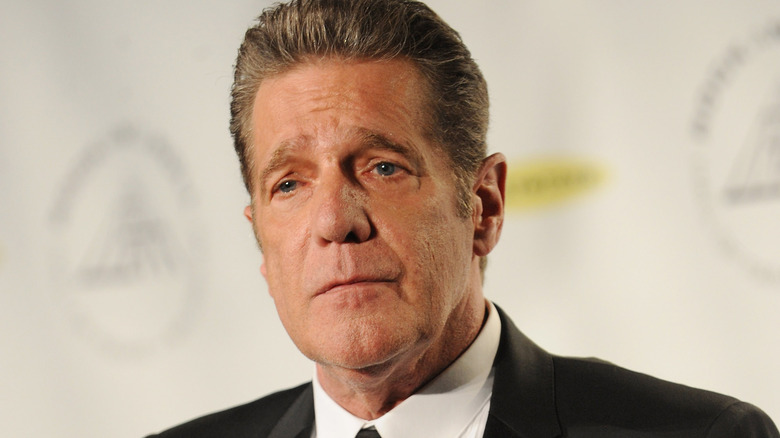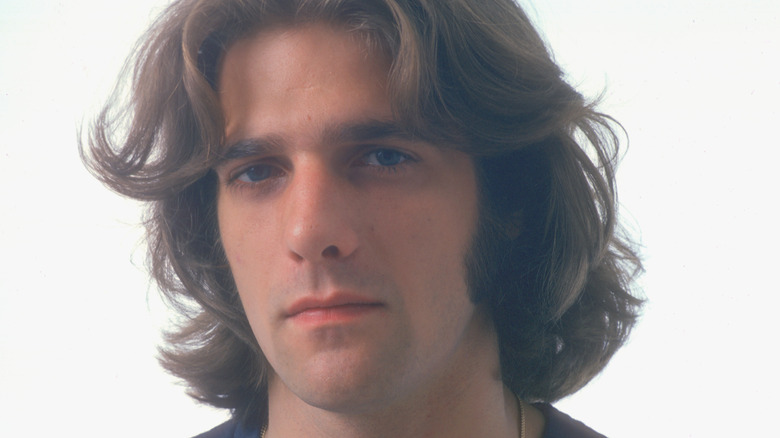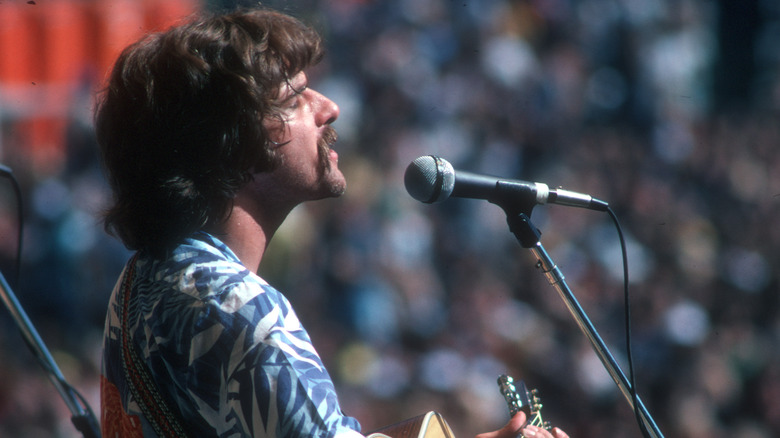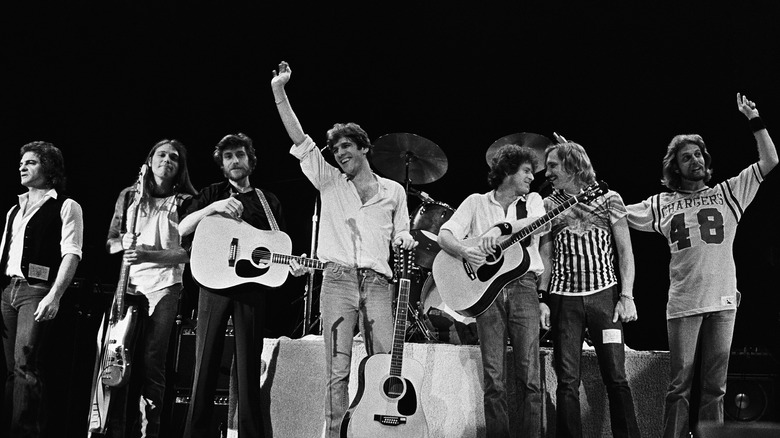The Untold Truth Of Glenn Frey
Along with Don Henley, Glenn Frey was one of the two main voices — and faces — of the Eagles. While singer-drummer Henley ably multitasked on classic songs like "Hotel California" and "One of These Nights," it was Frey taking the lead on tunes such as "Take It Easy" and "Heartache Tonight," complementing his vocals with a solid rhythm guitar. Granted, his status as a co-leader led to some controversy over the years, with former guitarist Don Felder referring to Frey and Henley as the Eagles' "dual-headed dictators" years after his 2001 firing. However, there's no changing the fact that Frey was a brilliant musician and songwriter who wrote and performed on some of classic rock's most enduring tunes.
Frey's death on January 18, 2016, at the age of 67 seemingly meant the end of the line for the Eagles, though that wasn't the case after all, as the late singer-guitarist was replaced by his son, Deacon Frey, and veteran country singer Vince Gill, allowing the band to continue touring despite the loss of one of their co-founders and leaders, per Tulsa World. But even with his exploits with the Eagles and as a solo artist and his occasional, yet notable forays into acting taken into account, there are several details about Frey that many fans aren't fully aware of when looking back on his legendary career.
Glenn Frey's first recordings were written by another Detroit legend
Although the Eagles are often seen as the quintessential California band of the 1970s, none of the band's original members were born or raised in the Golden State, as noted by The Guardian. That included Frey, who was born in Detroit, Michigan, in 1948, and would play in a number of Motor City garage bands as a teenager. Per the Detroit Free Press, these groups included the Disciples, the Subterraneans, and the Four of Us, and they mostly covered songs from the popular bands of the era.
In 1967, Frey formed a group called the Mushrooms, and unlike his earlier bands, this one actually recorded some original songs. But since Frey had yet to develop into a songwriter, it was another Detroit rock stalwart who did the writing for him — future "Night Moves" and "Old Time Rock and Roll" hitmaker Bob Seger. Thanks to Seger's manager Punch Andrews, the two young musicians worked closely with each other, with Seger helping the Mushrooms by writing both sides of their only single, "Such a Lovely Child" and "Burned," according to Something Else Reviews.
Later on, Frey would return the favor by playing on some of Seger's early recordings, including his first-ever Billboard hit, 1968's "Ramblin' Gamblin' Man," where he sang background vocals and played acoustic guitar. These would be the first of several collaborative efforts between the two rockers and/or their respective bands.
The surprising reason why Frey moved to California
Most musicians who move to California do so in order to improve their chances of becoming famous. In the late 1960s, Frey seemingly had no reason to take that route — at least not yet. He was close friends with Bob Seger, and the Detroit rock scene was taking off, with acts such as Seger, Ted Nugent, and the MC5 getting nationwide attention.
As Frey recalled to Brian McCollum of the Detroit Free Press in 2003, he was in line to join Seger's band as a bassist, and things were going so well for the would-be power trio that they decided to celebrate with a marijuana-fueled jam session in Seger's basement. Everything seemed to be falling into place for Frey — until his mother learned about his behind-the-scenes shenanigans. "My mother found out I was smoking pot, and she called Punch Andrews to say he might be jeopardizing his career. So of course that put the kibosh on me working with Seger," he recalled.
According to Frey, it was the best thing that could have happened to him, as that gave him the "impetus" to move to California. It also helped that the future Eagles co-leader was in a relationship with the singer of an all-girl band that signed a record deal soon after they relocated to the Golden State. Additionally, California's music scene was far more established than Detroit's, which made it even more of a no-brainer for Frey to move out of state.
Glenn Frey's role in the Eagles' 1980 breakup
Stressful as it was to record "The Long Run," the aftermath of its 1979 release was just as tense for the Eagles as they toured behind the album. The final date of the tour, which took place on July 31, 1980, was a benefit show for California Sen. Alan Cranston's re-election campaign, but as the Press-Telegram recalled, some of the Eagles were less than eager to mix politics with rock 'n' roll. These included guitarist Don Felder, who, when being thanked by Cranston for agreeing to do the show, sarcastically responded, "You're welcome, senator ... I guess," as quoted by Ultimate Classic Rock.
In his own recollection of the events, Frey admitted that he was upset with Felder for making that comment, and that led to some nasty vibes between the two bandmates as the Eagles performed that night. "So now we're onstage, and Felder looks back at me and says, 'Only three more songs till I kick your a**, pal,'" Frey remembered. "And I'm saying, 'Great. I can't wait ... We're out there singing 'Best of My Love,' but inside both of us are thinking, 'As soon as this is over, I'm gonna kill him.' That was when I knew I had to get out."
The next day, bassist Timothy B. Schmit spoke to Frey on the phone, and was promptly informed that the band was no more.
The TV series starring Glenn Frey that got canceled after one episode
Aside from his work as a musician, Frey also had his fair share of acting credits, as seen on his IMDb page. These include a guest appearance in "Miami Vice" in 1985 and a recurring role in the crime drama series "Wiseguy" on the small screen. You may also remember him as Arizona Cardinals general manager Dennis Wilburn in the 1996 Tom Cruise and Cuba Gooding Jr. film "Jerry Maguire." These were all supporting parts, but Frey did play a leading role in a TV show that was such a flop it was canceled after just one episode.
According to Ultimate Classic Rock, Frey was cast in the 1993 series "South of Sunset" as Cody McMahon, a man who quit his job as a Hollywood studio's head of security to work as a private investigator. The hype behind the show was real, and CBS heavily promoted its premiere with advertisements during that year's World Series.
When "South of Sunset" premiered on October 27, 1993, it drew less than 10% of that night's viewing audience, making it possibly the lowest-rated prime-time debut in TV history at that time. As such, CBS axed the show after that lone episode, though thankfully for Frey, his music career was about to pick up once again, with the Eagles just months away from reuniting for the first time in 14 years. In other words, hell was about to freeze over.
Frey's health problems started long before his death
Officially, Glenn Frey's cause of death was listed as complications from rheumatoid arthritis, acute ulcerative colitis, and pneumonia. It had been well-documented that the musician had been dealing with rheumatoid arthritis for about 15 years at the time of his death, and the Eagles postponed a December 2015 appearance at the Kennedy Center Honors after he was hospitalized with intestinal problems. However, the Chicago Tribune wrote that Frey had actually been dealing with the latter issue for close to three decades.
As explained by the publication, an intestinal disorder prevented Frey from performing at a reunion concert with Henley in 1986. Four years later, the singer-guitarist underwent surgery to remove part of his intestine, and that was one of the reasons why the Eagles' planned reunion fell through and wouldn't take place until 1994. And when the band was on their "Hell Freezes Over" reunion tour that year, Frey came down with a case of diverticulitis that led to the final dates of the tour getting canceled, per Taste of Country. These issues, he later admitted, might have been caused by his past drug and alcohol use.
As reported by Reuters, the musician's widow, Cindy Frey, filed a wrongful death lawsuit against Mount Sinai Hospital in Manhattan in 2018, alleging that her husband was "rendered sick, sore, lame and disabled" because of how his gastroenterologist failed to advise him of the risks and possible side effects of his ulcerative colitis treatment.





